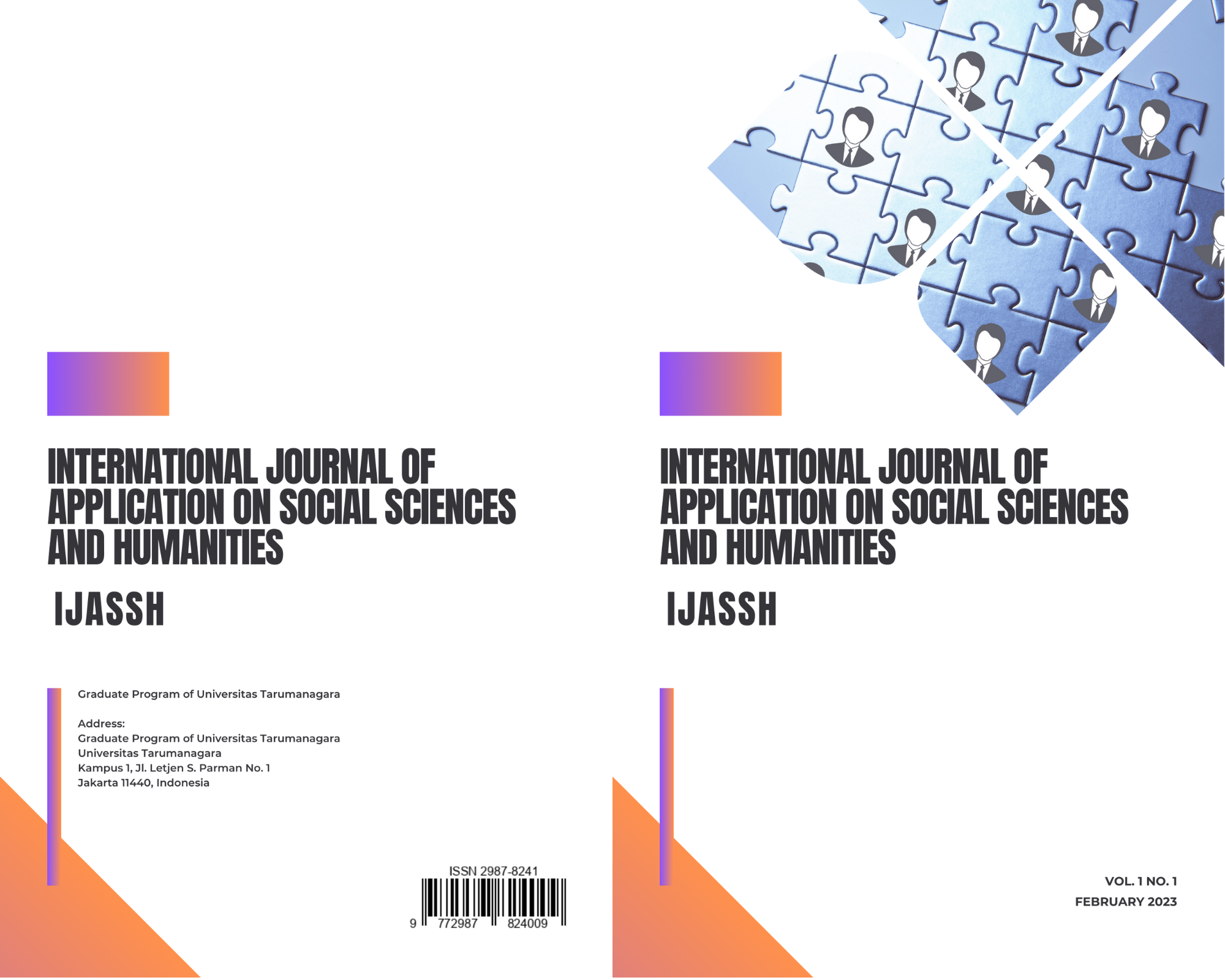THE ROLE OF PERCEIVED SOCIAL SUPPORT ON PSYCHOLOGICAL DISTRESS (STUDY ON EMERGING ADULTHOOD IN JAKARTA DURING THE COVID-19 PANDEMIC)
Main Article Content
Abstract
ABSTRACT
The COVID-19 pandemic that has lasted for three years had a negative psychological impact. Individuals feel depression, anxiety, restlessness, mental exhaustion, and feelings of worthlessness. The above condition is called psychological distress. This is felt by every individual, including emerging adulthood. In the developmental stage, early adult individuals are in a transitional period where there are changes in life that make individuals subject to psychological stress. Psychological distress is predicted by perceived social support [16]. Perceived social support can reduce the level of psychological distress. The purpose of this study was to determine the description of psychological distress and perceived social support, as well as to examine the role of perceived social support on psychological distress but in early adulthood in Jakarta. This study uses a non-experimental quantitative study method. Based on data analysis, the level of psychological distress of early adult individuals in Jakarta is low. Meanwhile, the level of perceived social support is quite high. Then, perceived social support is not significantly related to psychological distress. Thus, perceived social support may not necessarily reduce the level of psychological distress
Article Details
Section

This work is licensed under a Creative Commons Attribution-NonCommercial-ShareAlike 4.0 International License.
References
Anwar, F. (202m1, September 3). Update corona RI 3 september: ada 7.797 kasus baru, 574 meninggal dunia. Detiknews.Co. https://health.detik.com/berita-detikhealth/d-5708688/update-corona-ri-3-september-ada-7797-kasus-baru-574-meninggal-dunia
Arnett, J. J. (2000). Emerging adulthood: A theory of development from the late teens through the twenties. American Psychologist, 55(5), 469–480. https://doi.org/10.1037/0003-066X.55.5.469
Arnett, J. J. (2015). Emerging adulthood. Oxford University Press.
Arnett, J. J., Žukauskiene, R., & Sugimura, K. (2014). The new life stage of emerging adulthood at ages 18-29 years: Implications for mental health. The Lancet Psychiatry, 1(7), 569–576. https://doi.org/10.1016/S2215-0366(14)00080-7
Arradian, D. (2021, July 14). Studi: 80 persen masalah covid-19 soal psikologis dan stres. SINDONEWS.Com. https://sains.sindonews.com/read/482704/768/studi-80-persen-masalah-covid-19-soal-psikologis-dan-stres-1626242862
Chan, K., Moller, M., Marsack-Topolewski, C., Winston, P., Jennings, R., & Prifti, A. (2020). Age differences in non-medical prescription opioid use and psychological distress. Substance Use and Misuse, 55(11), 1808–1816. https://doi.org/10.1080/10826084.2020.1765808
CNN Indonesia. (2021, January 30). Pandemic fatigue, kelelahan mental karena pandemi. CNN Indonesia.Com. https://www.cnnindonesia.com/gaya-hidup/20210125160831-255-598142/pandemic-fatigue-kelelahan-mental-karena-pandemi
Condinata, F., Satiadarma, M. P., & Suyasa, P. T. Y. S. (2021). Psychological distress among emerging adults : A descriptive study. 41, 195–198.
Diveranta, A. (2021, January 26). Kegelisahan warga saat kasus melebihi angka satu juta. Kompas.Id. https://www.kompas.id/baca/metro/2021/01/26/kegelisahan-warga-saat-kasus-melebihi-angka-satu-juta/
Grey, I., Arora, T., Thomas, J., Saneh, A., Tomhe, P., & Abi-Habib, R. (2020). The role of perceived social support on depression and sleep during the COVID-19 pandemic. Psychiatry Research, 293, 1–6. https://doi.org/10.1016/j.psychres.2020.113452
Hockey, M., Rocks, T., Ruusunen, A., Jacka, F. N., Huang, W., Liao, B., Aune, D., Wang, Y., Nie, J., & O’Neil, A. (2021). Psychological distress as a risk factor for all-cause, chronic disease- and suicide-specific mortality: a prospective analysis using data from the National Health Interview Survey. Social Psychiatry and Psychiatric Epidemiology, 1–12. https://doi.org/10.1007/s00127-021-02116-7
Juliano, L., & Suyasa, P. T. Y. (2020). Peran Self-Esteem Dalam Mencegah Emotional Distress: Locus Of Control Sebagai Antecedent. Jurnal Muara Ilmu Sosial, Humaniora, dan Seni, 4(1), 224-233.
Kessler, R. ., Andrew, G., Colpe, L. ., Hiripi, E., Mroczek, D. ., Normand, S. L. ., Walters, E. ., & Zaslavksy, A. . (2002). Short screening scales to monitor population prevalences and trends in non-specific psychological distress. Psychological Medicine, 32, 959–976. http://journals2.scholarsportal.info.myaccess.library.utoronto.ca/tmp/16251877752428454629.pdf
Khatiwada, J., Muzembo, B. A., Wada, K., & Ikeda, S. (2021). The effect of perceived social support on psychological distress and life satisfaction among Nepalese migrants in Japan. PLoS ONE, 16(2), 1–9. https://doi.org/10.1371/journal.pone.0246271
Kompas.com. (2020, October 20). 5 fakta masalah psikologis masyarakat Indonesia selama pandemi. Kompas.Com. https://www.kompas.com/sains/read/2020/10/20/200200923/5-fakta-masalah-psikologis-masyarakat-indonesia-selama-pandemi?page=all
Lakey, B., & Cronin, A. (2008). Low Social Support and Major Depression. Research, Theory and Methodological Issues. Risk Factors in Depression, 385–408. https://doi.org/10.1016/B978-0-08-045078-0.00017-4
Mirowsky, J., & Ross, C. . (2003). Social causes of psychological distress (2nd ed.). Transaction Publishers.
Mukaromah, V. F. (2020, September 1). Melihat peningkatan kasus covid-19 di Indonesia dari bulan ke bulan. Kompas.Com. https://www.kompas.com/tren/read/2020/09/01/200200165/melihat-peningkatan-kasus-covid-19-di-indonesia-dari-bulan-ke-bulan
Nisa, I. S. (2021, March 30). Stres yang berujung depresi di tengah pandemi virus covid 19. http://ners.unair.ac.id/site/index.php/news-fkp-unair/30-lihat/1117-stres-yang-berujung-depresi-di-tengah-pandemi-virus-covid-19
Olagunju, A. T., Bioku, A. A., Olagunju, T. O., Sarimiye, F. O., Onwuameze, O. E., & Halbreich, U. (2021). Psychological distress and sleep problems in healthcare workers in a developing context during COVID-19 pandemic: Implications for workplace wellbeing. Progress in Neuro-Psychopharmacology and Biological Psychiatry, 110(February), 1–5. https://doi.org/10.1016/j.pnpbp.2021.110292
Pranita, E. (2021, March 10). Varian baru B.1.1.7 ditemukan di Indonesia, ini 3 alasan kenapa virus corona terus bermutasi. Kompas.Com. https://www.kompas.com/sains/read/2021/03/10/183000123/varian-baru-b.1.1.7-ditemukan-di-indonesia-ini-3-alasan-kenapa-virus?page=all
Procidano, M. ., & Heller, K. (1983). Measures of perceived social support from friends and from family: Three validation studies. American Journal of Community Psychology, 11(1), 1–24.
Reti, T., Terte, I. De, & Stephens, C. (2021). Perceived social support predicts psychological distress for ambulance personnel. https://doi.org/http://dx.doi.org/10.1037/trm0000331
Ross, C. . (1990). Religion and psychological distress. 29(2), 236–245. http://www.jstor.org/stable/1387431
Saputra, D., Monty, P. S., & Untung, S. (2019). Penerapan Art Therapy Untuk Mengurangi Perilaku Menyakiti Diri Sendiri (Self-Injurious Behavior) Pada Dewasa Muda Yang Mengalami Distress Psikologis. INQUIRY Jurnal Ilmiah Psikologi, 10(1), 26-40.
Urano, Y., & Ikeda, T. (2020). Perceived social support moderates the association between emotion regulation and psychological distress: a cross-sectional study among Japanese adults. Psychology, Health and Medicine, 00(00), 1–11. https://doi.org/10.1080/13548506.2020.1802051
Veit, C. T., & Ware, J. E. (1983). The structure of psychological distress and well-being in general populations. Journal of Consulting and Clinical Psychology, 51(5), 730–742. https://doi.org/10.1037/0022-006X.51.5.730
Worldometer. (2021). COVID-19 coronavirus pandemic live update. https://www.worldometers.info/coronavirus/
Zimet, G. D., Dahlem, N. W., Zimet, S. G., & Farley, G. K. (1988). The multidimensional scale of perceived social support. Journal of Personality Assessment, 52(1), 30–41. https://doi.org/10.1207/s15327752jpa5201_2

